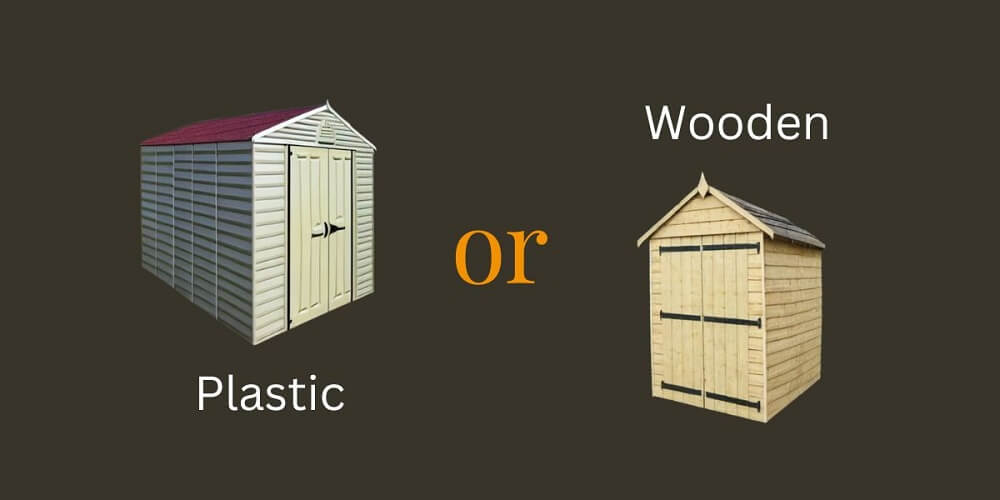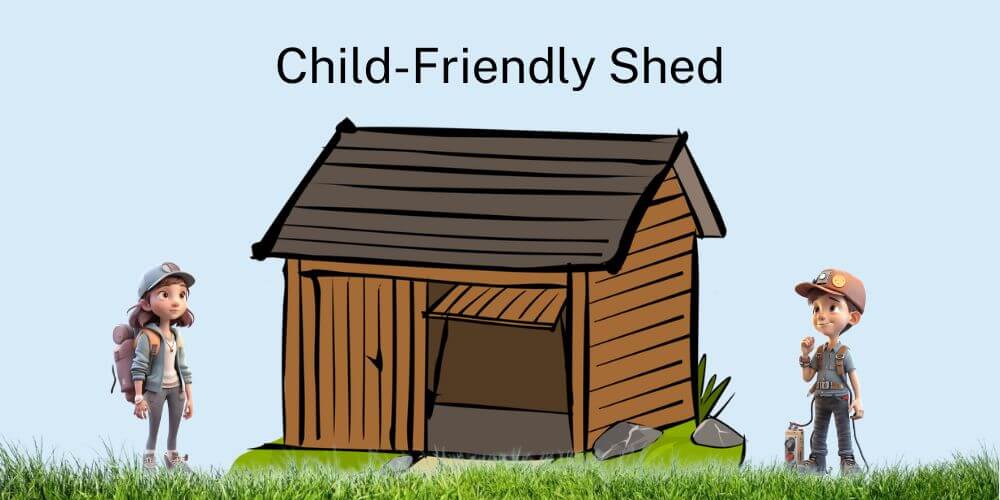Plastic or wooden shed? This is one of the most frequently asked questions when it comes to purchasing a shed. In fact, this is usually the second step in the process to buy a shed.
You might be wondering whether a plastic or wooden shed would be the better choice for your needs. Both types of sheds have their own advantages and disadvantages, and it can be difficult to decide which one is right for you.
In this post, we will explore the pros and cons of plastic and wooden sheds, as well as factors to consider when making your decision. By the end of this article, you will have a better understanding of the differences between these two types of sheds, and be able to make an informed decision on which one is the best fit for your specific needs.
Plastic Sheds
Pros
- Can last longer in wet conditions.
- Low maintenance required.
- Pest-Proof.
- No rotting.
- Resistant to mold and mildew.
- Lightweight.
- Easy to assemble.
- Affordable.
Cons
- Relatively week.
- Susceptibility to UV damage.
- Limited customization options
- Not aesthetically pleasesant.
Wooden Sheds
Pros
- Stronger and sturdier.
- More customization options.
- Visually appealing.
- Attachment of heavy shelving.
- Durability when treated.
Cons
- Requires maintenance.
- Wood has imperfections.
- Harder to assemble.
- Susceptibility to bug & pests.
- Susceptibility to rot.
- Affordability.
How to minimize plastic sheds disadvantages?
Plastic sheds offer numerous advantages over wooden sheds however, some people may be concerned about their relative weakness, susceptibility to UV damage, limited customization options and the fact that isn’t as much apealing as the wooden sheds.
To address these concerns, you can search for plastic sheds with thicker or reinforced plastic materials. Additionally, support beams can be added to the shed to increase its strength. Choosing a plastic shed with UV-resistant properties or applying a UV-protective coating can mitigate UV damage. Furthermore, selecting a plastic shed with customization options or purchasing accessories that allow for personalization can help address the issue of limited customization options.
Solving plastic sheds disadvantages can affect its affordability and lightweight advantages.
Another potential drawback of plastic sheds is that they may not be aesthetically pleasing. Fortunately, there are ways to improve their appearance. For example, choosing a plastic shed with a more attractive design can enhance its visual appeal. Alternatively, decorative features such as landscaping or painting can be added to the shed to improve its appearance. With these modifications, plastic sheds can be a functional and visually appealing storage solution.
How to minimize wooden sheds disadvantages?
Wooden sheds disadvantages can be minimized by taking some steps. Regular maintenance, such as painting or staining the wood, can help protect the shed from the elements, prolonging its life. Sanding and filling any imperfections before painting or staining can also help improve its appearance.
To make assembly easier, pre-fabricated sheds can be purchased or hiring a professional to assemble the shed can also be an option. Additionally, wooden sheds can be treated with chemicals to deter bugs and pests, and using pressure-treated wood can help reduce the risk of rot.
Affordability is another concern with wooden sheds. To address this, one can consider purchasing a smaller shed or using salvaged or repurposed wood for construction. A DIY approach can also be a cost-effective option for those with carpentry skills.
Properly treated and maintained wooden sheds can last for many years, even decades, and withstand harsh weather conditions better than untreated wood or plastic sheds.
Other factors to consider
When deciding between a plastic or wooden shed, one of the primary considerations is the available garden space. Plastic sheds are generally smaller and more compact, making them ideal for smaller gardens, while wooden sheds can be larger and require more space.
The location of the home is also an essential factor to consider. Plastic sheds are more suitable for areas with a damp climate as they are less susceptible to rot, while wooden sheds are better suited for dry areas. The shed’s foundation and flooring can also be affected by the home’s location, with wooden sheds requiring a more substantial foundation and flooring to prevent moisture from seeping in.
At the end, when deciding between a plastic or wooden shed, it’s essential to consider various factors, such as available garden space, home location, flooring, personal preferences, intended use, durability, cost, and customization options. By taking these factors into account, individuals can make an informed decision that meets their specific needs and preferences.



